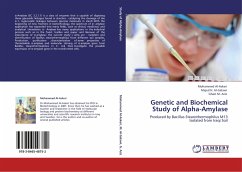Understanding the role of SNTA-1 protein in carcinogenesis can be of enormous help in the understanding of carcinogenesis. It may provide evidence for potential, novel, emerging or re-emerging targets for one or more diseases. We studied the expression of 1-syntrophin (SNTA1) protein in histologically confirmed esophageal, stomach, lung, colon, rectal and breast cancerous human tissue samples. Our results suggest a significant decrease in the expression level of SNTA1 protein in both esophageal squamous cell carcinoma (ESCC) and esophageal adenocarcinoma (EAC) compared with their respective controls while a significant increase in expression of SNTA1 protein compared with the normal tissue was observed in breast carcinoma samples. Our results suggest that SNTA1 has a role in carcinogenesis and could possibly be used as a novel diagnostic or prognostic marker in esophageal and/or breast cancers
Bitte wählen Sie Ihr Anliegen aus.
Rechnungen
Retourenschein anfordern
Bestellstatus
Storno








